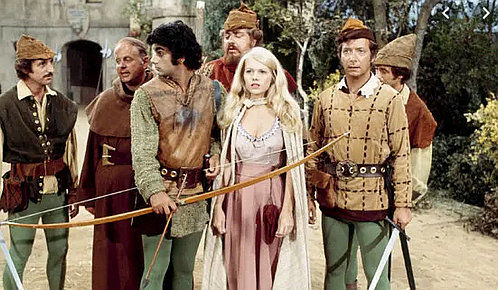A titan has fallen. At the moment of writing, TV.COM's users haven't been able to log into their accounts for over a month. Thus rendering the site defunct and forcing users to look for a new service where they can piece their watchlist back together. Although the site has lost its relevance here's a history log of what was once the biggest TV site on the web.
This is one person’s view of what happened. I don’t claim to have a complete picture, and I’m still apparently under NDA restrictions on some points so I can’t/won’t speak on them. I’ve tried to avoid referencing other sites and sources to fill in the blanks. I’m sure other people have experienced different things, and they’re free to chip in. If they’re reading TVMaze.
One clarification: this is not a defense of TV.Com. I think there are a lot of things that TV.Com did right on the microscale. It’s still one of the easiest cast- and crew-adding sites around that I’ve found. It’s on the macroscale that they’ve screwed the pooch. And I’d like to think I’m taking an even-handed approach. I understand the corporate mentality, even if I don’t agree with it. I can hopefully see what TV.Com did and why, even if I don’t agree with the outcome.
And a disclaimer: I wrote a modified version of this article on TV.Com a year or so ago.
On with the motley.
-----
The Beginning: “Life Goes On”

Once upon a time there was TVTome. And then around 2005 CNET acquired TVTome's volunteer-contributed data from the owner, John Nestoriak; reputedly for $5 million, although I've never seen either side go public with the exact figure. CNET eventually ported the data into their new site, TV.Com. To the best of my knowledge, John has never emerged on TV.Com. No doubt he’s on a beach somewhere sipping mai-tais and glad to be rid of the whole mess.
According to several people I trust, at the time, CNET didn’t wish to give the users any input into the system. Imagine what TV.Com would have been like if users couldn’t contribute anything! Kinda like it was at the end, except even less contributions and a decade or so earlier.
When that decision was met with outrage, CNET apparently instigated the editor system. Previous editors on TVTome with enough contributions (“Contribution Points”, or CPs) were made editors of the new pages. Some contributions were lost or never ported over, so some TVTome editors found themselves editors no more.
Also, TV.Com implemented a “moderator system”. A group of dedicated users, including myself, were appointed moderators and had access to a moderator lounge and the “flag” system. There were forums, one per show whether there was any expressed interest or not. When a new show was added, so was a forum. The moderatable “crimes” were the same you find at most sites. Us moderators fine-tuned them over the years, but always with the staff of the time having the final say.
The editing process went on pretty much unchanged during this time. People who were editors had a queue that they could handle subs to “their” shows. Staff got the subs to shows and actors who had no editors, and they processed them. Someone contributed enough (80 CPs for shows, 40 for actors) and they became the editor. There was supposedly a 3-day period for editors to moderate current shows, and a 7-day period for everything else. Those rules didn’t apply to staff, and they never said that they did. Still, staff was pretty good about following the same guidelines.
The staff was fairly active on the site, both on the general forum and with the moderators in private.
-----
The Middle- “Users in the Middle”

And then the initial staff got laid off. Or fired. Or moved onto different jobs inside and outside of the company. Somewhere around this time, CNET merged with CBS, or got bought out, or something. The result was, CBS now had two TV-related properties, TV.Com and TVGuide, and they were sometimes in competition with each other. In part because of this, and in part because the bloom was off the rose as far as TV database sites, and in part because of the economy, TV.Com was slow to replace the departing staff, or decided they didn’t need to replace them or could "replace" them with lesser numbers. One person can do the job of two, right?
Rather than merge TV.Com’s database with TVGuide’s relative popularity, CBS kept the two properties separate. Whether it was because TV.Com’s programmers (i.e., “Development”) couldn’t untangle the TV.Com coding and port the data again, because the original programmers had moved on and done their work in haste, or CBS told the new programmers not to bother, or something else, is one of those “What happened?” kind of things that have never been revealed.
Moderators were let go with a token “thank you but your services are no longer required”. We, and the users, were told that staff would take over, and that soon the site would go to a better user-conversation system. One of the reasons given, was that moderator level had dropped. Which was odd, since a) staff had slowly reduced their interaction with moderators, and b) the moderator forum went public due to a bug that was never fixed. Hard to report people for banning when the reports were public knowledge.
The 3-day deadline for processing subs on current shows was changed to 7 days. This was “nicer” to editors, and made less work for staff. But it also meant TV.Com was less competitive. Why contribute to a current show and wait 6.9 days for the editor to check your subs?
“Communities” were created and forums were removed. Editors could no longer communicate directly with their communities. Staff had a few token communication forums, but didn’t make much use of them. Communities were never “defined” as far as what was okay and what wasn’t to post on them. You could supposedly follow other people and see when they posted.
Communities had their upsides and their downsides. The editing tools were slightly better. The communities were a little more visible. A lot of it sounded good in theory. But… the followup notifications never really materialized: you could see when someone you followed made a new thread, but you couldn’t see when they posted on an existing thread unless it was one you created. Sometimes notifications came up, sometimes they didn't, sometimes they came and went and came again. Notifications didn't appear on the moderator page for some reason. And communities were dependent on staff creating them. If staff didn’t think they should be created they weren’t created. And no criteria was given for how a community would be considered for creation.
In fact, a lot of criteria was removed at this point. It may have made things easier for the reduced staff, because they didn’t have to worry about following pesky guidelines and being consistent with themselves and their predecessors. Or deal with users who didn’t follow the guidelines. It also left users floating in limbo. There’s always a fine line between too many guidelines and not enough. But the pendulum had clearly swung toward the latter.
Staff writers produced original articles for TV.Com and were at least somewhat involved in the communities. The communities primarily promoted the original articles, so the writers had a stake in involving themselves.
-----
The End – “When Things Were Rotten”

Staff levels dropped even further. This and the flawed changes during the middle stage caused less revenue, which meant TV.Com undertook further “cost-saving measures”. The site got generic advertising, and more of it, as “real” advertisers figured TV.Com was no longer a decent advertising investment.
Staff writers were “fired”, and transferred over to TVGuide if they weren’t already there. And their articles there were ported over to TV.Com. This saved money, yes, but didn’t give a lot of people reason to come to TV.Com for the articles, which were a strong basis for the communities. Which meant communities got less traffic. Which meant revenue went down, which meant TV.Com undertook more cost-saving measures. Rinse and repeat.
To further save money, TV.Com cut some kind of deal with a still-unidentified “Source”. The Source would provide data on new episodes, the data would be imported automatically, and editors would no longer be able to edit episode numbers and titles, or add new episodes. Only staff could make changes. The process was flawed, so there were a lot of changes and fixing of omissions that they had to do. It also meant any unpaid employee was working for the Source without any direct input, or even knowledge of what was considered valid to contradict the Source.
Also, the information from the Source was often screwed up. Bogus episodes that had an airdate decades after the show was cancelled. Sometimes they were removed, and then would pop up again.
Staff boiled down to one public figure, JK (JessicaKroeber). She was also the point person for fixing the errors caused by the episode-import system. How much a part she played in all this has never been revealed. In her online resumes, JK takes a lot of the credit but none of the blame. Not surprisingly: who is going to take blame on their resumes? Given all this, it’s not clear what she implemented and what she was told to implement.
There was also some Development people. Their anonymity was always one of the sticking points of the site. Yes, it makes sense that they not take time out to answer dozens/hundreds/thousands of user queries due to their identities being public. However, apparently no user had the means to contact them. This meant if there was a problem or if the site went down, you either had to hope they noticed the problem, or try to relay the problem through JK, if the site was up, so you could do so. Going through a middleman to describe sometimes complicated technical issues was… problematic.
CPs levels dropped from 80/40 to 70/30, respectively. Staff also pretty much “rubber-stamped” submissions, using a mass-approval tool (judging from the timestamps) to process subs. This meant that subs weren’t checked for accuracy or duplication, and anyone could submit practically anything and get it approved. When there were occasional rejections, they were often weird, and/or inconsistent. This no doubt made time for JK to deal with the other problems like the importing system. But while she treated the symptoms, the diseases were never cured. It also meant a drop in site quality, which led to less visitors, which meant lowered revenues, and on and on.
Late in this period, JK stated that CPs levels were dropped entirely. Unless an editor was MIA or incompetent, they could never be replaced. This was a good idea in theory: it’s how TVTome used to operate. However, it requires an involved staff, and the remaining one-person staff was too busy with other stuff to be involved.
Finally someone--maybe JK, maybe her superiors with JK passing on the word--determined that they were dropping the whole in-site system of contacting her and TV.Com in general and going with off-site email. Then JK left, and no one took her place to do what she did.
Spammers, which were a problem since forums were around, proliferated for a while. Presumably, JK dealt with the flagged messages. But there was a backlog of reported spam that never was dealt with. Spammers learned it wasn't worth it to waste their time on TV.Com since it was a “dying” site.
TV.Com was supposedly part of CBSInteractive, according to the latter’s website. The email leads to a Google group that doesn’t allow you to send emails. When I tried to call, the Los Angeles office referred me to the New York office. The New York office had no idea what CBSInteractive was. After calling back the LA office, and diving through a few levels of bureaucracy, the CBSInteractive receptionist said she didn’t know who handled TV.Com, and forwarded me to the Associate Business Manager. She said she didn’t know anything about TV.Com, offered to contact someone and have them call me back, and wanted to know my business. Given her rather vague response, I didn’t give her any details. No one has contacted me.
And that’s where we’re at today. In Part 2, I ‘ll look more at the things that went wrong.
Written by Gislef on Oct 3, 2019




good article, I found this site because the Fall of TV.Com.
nice one Gislef...interesting read.
Thanks everyone for the kind words. I have Part II ready to go: it's just a matter of finding the time to put it up.
While corporate mentality was certainly a big part of why TVCom failed, IMO another part of it is that... there's really no need for it. There's one big site, IMDB, that got in on the ground floor and has kept up with the times by adapting to TV and phone apps. There are individual fan sites and wikis for the shows that have a fan following (and quite a few that don't). You've got your schedules and cast info and such on your TIVO.
The catch-22 of a TV/media site is that you have to spend money to look professional and provide unique material. But you need to look professional to make money. If you want professionals, you have to pay them. That's what the definition of "professional" is. :)
That, and media sites by definition don't fundamentally deal with unique material, because they're getting their information from existing media. You can't have "unique" cast lists and photos, because you're getting the information from somewhere else.TVCom couldn't get people to read their site, to generate income via ads, so they couldn't pay the professional writers to stay on. Once the professional writers left, the site looked less professional and more users left, and so on and so on. They addressed a niche that IMDB was already filling.
A really well written article, was a great read!
@Jan Yes, the login started working a couple of days ago. It seems to lock people out periodically, although this last time seemed a bit longer than usual.
@cheshirecat Looks like the user login started working around the time the article was posted.
The login is working now. So it seems user profiles have not been removed.
I'm from the time TVtome era and was present when TV.com was launched. It was a big deal back then.
TV.com started really strong and was in the top 100 most visited sites on the web. To me personally it's interesting to see how companies that buy sites/existing products manage things behind the courtains and make long term decisions. Is it to just kill off a competitor or do they really see the potential of it. May it be strategic or financial.It would be interesting to get some more info on their original plans when they decided to buy TVTome and where they wanted TV.com to evolve towards. For some users it really left a bad taste when they decided to make TV.com a slave of TVguide in regards to content. That was a really negative signal. I would of imagined that for CBS this would of been a great promotional tool to have in their advertisement portfolio.
Wow!... I am/was a TV.com member and a really big user of it around 2010-2012 for organizing the TV shows I liked. I truly was a forerunner for sites like TV Maze. I haven't tried to logon in a while but once I find my old password I will try, but after reading this, I guess I won't get access.
This was a fascinating deep-dive into something I genuinely didn't know I wanted to read about. I find the interactions between fandom and corporate entities to be so difficult to manage and untangle, and I appreciate hearing about your personal experience with exactly that over the years. Looking forward to Part II!